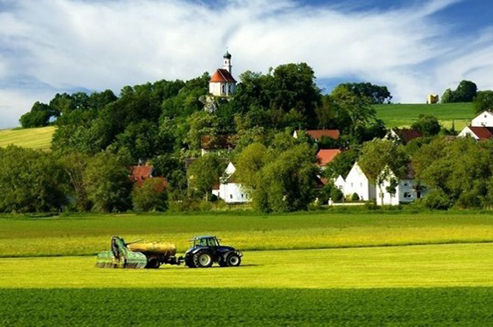In our rapidly urbanizing world, the daily food supply is becoming increasingly dependent on production and distribution systems. It is a global challenge to keep food production and distribution systems efficient. Defective systems result in suboptimal performance levels and losses in both economic and nutritional value.
Can Poland keep up with the high European standards and can Dutch entrepreneurs play a leading role?
The Netherlands is one of the very few countries in the world where, within the agro and food sector, the secondary sector and the tertiary sector have a higher share than the primary sector. Furthermore the Dutch agro and food sector is known for its high quality and advancement in terms of production yield technology and innovation.
The above is achieved through the deployment of different methodologies to manage food quality and food security, including source identification and traceability. The integrated agro food logistics concepts are the backbone of the high performing (inter-) national agro food chain in the Netherlands. It enables the agro and food sector to provide good quality and safe food products in a cost-effective and resource sustainable way. Sustainability of the agro and food sector is based on strategic market analysis, infrastructure and connectivity, transport modalities, institutional and regulatory framework, technology dissemination, open innovation and support and coaching of start-up companies.
Partnerships with Dutch companies can be an excellent strategic move for Polish agro and food companies. Dutch Polish partnerships can help Polish companies to get access to technology and food security concepts and endorse business opportunities for Dutch entrepreneurs.
To become an agro & food industry hub, the Polish agro & food sector needs further transformation through increasing production, improving organization of the agro & food sector and optimizing the agro & food supply chain. To increase the production (in terms of quantity and quality) there is a need to cultivate more land, increase the yield of cultivated areas and consolidation of the size of the average farms. There is a need to further optimize the organization of the agro & food sector through models such as contract farming, producer cooperatives and value adding services such as food processing technologies. To optimize the agro & food supply chain there is a need for optimized logistics systems, infrastructure, post harvest management models and integration of supplies.
Key drivers, within the agro & food primary sector –agro products production-, affecting the competitiveness are arable land, labor costs and energy. Arable land in the EU is scarce and this is what makes Poland an attractive destination for agro & food production. As of 2010 only around 20 percent of arable land was leased, compared to 40 percent in the EU countries. Leases in Poland are often informal and the market is opaque. Transparent regulations aligned with incentives for owners and users should provide more incentives. However, Poland is located very strategically in Europe and cheap land, combined with cheap labor, provides a range of business opportunities in the primary sector (production) for Dutch entrepreneurs who are known for being farmers with high productivity yield.
As for the secondary sector, reorientation from production of low-value-added raw produce towards processed products is needed. This can be structured and materialized through models such as contract farming allowing food processing companies to engage farmers as suppliers, with prices contractually stipulated. The consequent aggregation of supplies has been used to great advantage in for example subsectors within the Dutch agro & food sector, pork production in Denmark and the United Kingdom and the production of wine across many countries. Producers cooperatives are promoted by the EU and the Polish government. These producer groups enable agricultural producers to integrate horizontally and, while retaining land ownership and a measure of independence, capture some economies of scale. Producer groups enjoy negotiating advantages with processors and receive dedicated subsidies. Dutch farmers are familiar with working on the basis of contract farming and producers groups and therefore they would fit perfectly as players in the Polish agro & food industry.
Example: In Poland cooperatives have been successful with apple producer groups. On average, EUR 290.000 in subsidies have been offered to producers in the first five years of producer group programs, typically for the construction of storage and sorting facilities. Group-owned facilities enabled increased utilization of labor (by employing farmhands out of season) and adding value by selling produce in all seasons, not solely during harvest time when prices are lowest.
The tertiary sector, including (technology) services and logistic systems, is still poorly developed and therefore slows down the process of (further) modernization of the Polish agro & food sector. Numerous Polish companies have invested in modern production-line infrastructure, especially in dairy, meat, frozen food, and beverages. Here Joint Ventures with Dutch companies created added value similar to investments in conservation, filtering, and packaging innovation.
Dutch entrepreneurs need to seek opportunities by consolidating food processors to gain needed scale; adoption of cooperative model for fragmented producers, increase food product complexity and move up the value chain, for instance with organic food and products for customized diets.
The Netherlands Council for Trade Promotion (NCH) has been instrumental in the internationalization of Dutch companies for almost 70 years. Within the NCH, The Netherlands Polish Council for Trade Promotion (NPCH) is active in the promotion of business between The Netherlands and Poland. The NCH will be present during the Warschau Food Expo to enable Dutch entrepreneurs to meet their Polish counterparts. Becoming a member of the NCH/NPCH helps entrepreneurs to start business in Poland and learn from existing network, knowledge and experiences on the Polish market.
For information, please contact: Anastasia Karnaokov – akarnaokov@nchcnl.nl | 070 344 15 88
Source: Netherlands Council for Trade and Promotion
Photo © The Netherlands Council for Trade Promotion (NCH)



